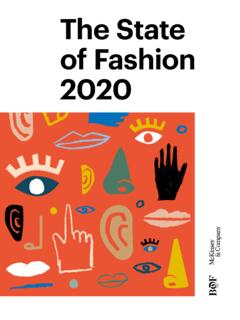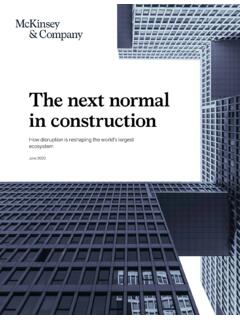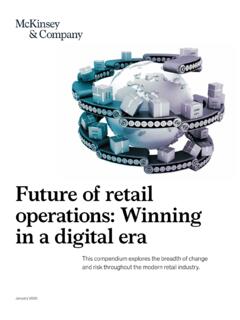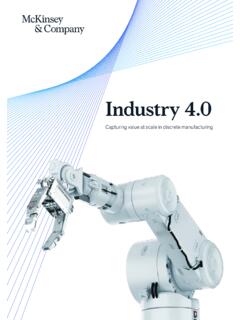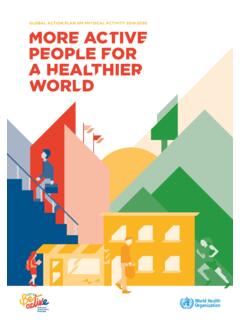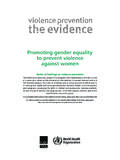Transcription of A global view of how consumer behavior is changing amid ...
1 CONFIDENTIAL AND PROPRIETARYAny use of this material without specific permission of McKinsey & Company is strictly prohibitedJuly 7, 2020 Discussion documentA global view of how consumer behavior is changing amid COVID-19 Nidhi Arora, Tamara Charm, Anne Grimmelt, MianneOrtega, Kelsey Robinson, Christina Sexauer, Yvonne Staack, Scott Whitehead, Naomi YamakawaMcKinsey & Company2 COVID-19 is first and foremost a global humanitarian challenge. Thousands of health professionals are heroically battling the virus, putting their own lives at risk.
2 Governments and industry are working together to understand and address the challenge, support victims and their families and communities , and search for treatments and a the humanitarian challenge is, of course, priority #1. Much remains to be done globally to respondand recover, from counting the humanitarian costs of the virus, to supporting the victims and families, to finding a document is meant to help with a narrower goal: provide facts and insights during the current COVID-19 situation. In addition to the humanitarian challenge, there are implications for the wider economy, businesses, and employment.
3 This document includes consumer insights from surveys conducted globally between June 16 and June 21, & Company3We are tracking consumer sentiment across 45 countriesAMERICAS APACAFRICA AND MIDDLE EASTA rgentina Brazil Dominican Republic Guatemala Belize Honduras El Salvador Nicaragua Costa Rica Panama Canada Chile Colombia Mexico Peru USA Australia China India Indonesia Japan New ZealandEUROPEB elgium Denmark France Germany Italy Netherlands Poland Portugal Russia Spain Sweden Switzerland Turkey UK Morocco Nigeria Saudi Arabia South Africa Qatar United Arab Emirates EgyptThe boundaries and names shown on this map do not
4 Imply official endorsement or acceptance by McKinsey & CompanyPakistanSouth Korea McKinsey & Company4 COVID-19 has affected consumer behavior in five key ways, some of which will have a lasting impact Most categories have seen more than 10 percent growth in their online customer base during the pandemic and many consumers say they plan to continue shopping online even when brick-and-mortar stores reopen In markets that had high online conversion rates before the pandemic ( , UK and the US), e-commerce continues to grow across all categoriesFlight to digital and omnichannel Across countries.
5 Survey respondents say they buy more from companies that have healthy and hygienic packaging and care for their employees The actions that businesses take during this pandemic are likely to be remembered for the long-termHealth and caring economy Many consumers globally are continuing to see their incomes fall and optimism in an economic recovery hasn t seen a resurgence Consumers are more mindful of their spending and trading down, as they expect COVID-19 s impact to last four-plus months Consumers intend to shift their spending largely to essentials, such as grocery and household supplies, and cut back on discretionary categoriesShift to value and essentials In most countries, more than 70 percent of consumers don t yet feel comfortable resuming their normal out-of-home activities While many consumers plan to go out for grocery shopping and socializing with friends.
6 They are staying away from travel and crowded spacesHomebody economy For certain products and brands, COVID-19 caused supply-chain disruptions, leading consumers who couldn t find their preferred product at their preferred retailer to change their shopping behavior , including trying different brands and stores Across the globe, value was the main driver for consumers trying a new brand or place to shopShock to loyaltyWhile these changes in consumer behavior hold overall, there are variations in every : McKinsey & Company, COVID-19 consumer Pulse surveys, conducted globally between May 15 and June 21, 2020 McKinsey & Company5 While optimism varies by country, it has not seen a resurgence1Q: How is your overall confidence level on economic conditions after the COVID-19 situation?
7 Rated from 1 very optimistic to 6 very pessimistic. 2 Net optimism is calculated by subtracting the percent of respondents who answered 5 pessimistic and 6 very pessimistic from the percent of respondents who answered 1 very optimistic and 2 optimistic. Optimism about own country s economic recovery after COVID-191 Net optimism %2 100-30-40-502030-20-10405060 More optimisticLess optimisticMay 17 Apr 12 Apr 5 May 3 Apr 19 Apr 26 May 10 May 24 ChinaIndiaUSBrazilGermanyUKKoreaItalyFra nceSpainJapanShift to value and essentials Source.
8 McKinsey & Company, COVID-19 consumer Pulse surveys, conducted globally between March 15 and June 21, 2020 China, India, and the US remain the most optimistic countries even as their optimism fluctuates across weeksMost European countries, as well as Korea and Japan, have more consumers who are pessimistic about an economic recoveryIndia, France, and the UK experienced sharp upticks in June, following recent declines in May Jun 7 Jun 21 McKinsey & Company694543322202310 Income increasedConsumers globally have experienced a decrease in income in the past two weeksRespondents who experienced a decrease vs increase in income over the past two weeks1% of respondents1 Q: How has the coronavirus (COVID-19) situation affected your (household) income over the past two weeks?
9 48 SpainSouth Africa34 BrazilUSUKF ranceItalyGermanyIndiaJapanKoreaChinaInc ome decreased35737043274556284655 Shift to value and essentials Source: McKinsey & Company, COVID-19 consumer Pulse surveys, conducted globally between June 15 and June 21, 2020; source of data for South Africa and Brazil was from McKinsey & Company, COVID-19 consumer Pulse surveys, conducted between May 15 and May 25, 2020 Although global consumers are experiencing a decrease in income, the depth of income loss varies significantly across countriesConsumers income has been impacted most in Brazil, South Africa, and IndiaEven in China, where many consumers are back at work.
10 55 percent still report a decrease in incomeMcKinsey & Company7 Most consumers outside China believe a return to normal will take more than four months1 Q: How long do you believe you need to adjust your routines, given the current coronavirus (COVID-19) situation, before things return back to normal in your country ( , government lifts restrictions on events/travel)? 2 Q: How long do you believe your personal/household finances will be impacted by the coronavirus (COVID-19) situation?.The majority of global consumers, excluding those in China, expect COVID-19 to impact their routines for 4+ monthsWhile most Chinese consumers expect impact to their routines to last for 2-3 months more, they expect their finances to be impacted for longerMany consumers, particularly in Germany, France, Japan, and the US.



